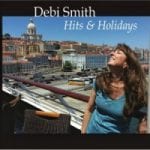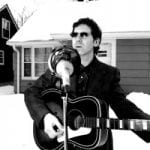Singer-Songwriters of the Calgary Roots Scene Part 1: Tom Phillips
Leader of the local country scene, Tom Phillips generates awe and envy wherever he goes in Calgary. Other country singers are persistent in their efforts to reach his level of success, and his audience treats him like the local celebrity he has become. With a catalogue of jumpin’ honky tonk tunes, heartbreaking ballads, and slightly tortured existential folksongs, Phillips is equally at home in both the country bars and the folk venues scattered across the city. He is one of the few to have made music his full-time job without leaving Calgary: although he occasionally travels to Edmonton and some of the smaller towns in Alberta, he has successfully navigated the perils of independent music making in a relatively isolated Canadian city.
Tom grew up in Calgary, dividing his time as a child between learning music and riding horses with his father in a rural community south of the city called Bragg Creek. Phillips was inspired by songwriters such as Gordon Lightfoot and Bob Dylan, the landscape of Calgary, and the surrounding rural environment of Alberta: “I grew up here and in Bragg Creek. My father was a lawyer but he was a big country music fan and he thought he was going to be a cowboy but really he was a corporate lawyer. And he bought this land out at Bragg Creek so we always had horses and we spent our summers and all weekends and a lot of our time out there. And he died when I was eight…but he taught me a couple chords on the guitar, so that’s how I got into it. I started out with my dad playing old Wilf Carter songs and Sons of the Pioneers and that kind of stuff, that’s what he loved, and then of course when I was growing up, I never really got into pop music that my friends were listening to, ‘cause at that time would have been Led Zeppelin, all that stuff, what I dug was Gordon Lightfoot, Leonard Cohen, singer-songwriter, that’s what really affected me. ”
Phillips attended both the University of Calgary and the University of Alberta (in Edmonton), taking up the French horn in an effort to complete a music degree, but he eventually abandoned the horn to focus entirely on guitar. Like all young Canadian songwriters, he felt compelled to head out to Toronto, the centre of the country’s music industry, in the mid-1980s. There, he connected with a community of songwriters and honed his craft, sometimes writing songs inspired by bizarre situations like his friend’s car catching fire in “Luck Gone Bad,” which is also a tearful rumination on the demise of a relationship. He remembers: “We used to play this place down there called Fat Albert’s coffee house and it was like you draw numbers and everybody would get up and play. Bobby Wiseman was one of them, Sam Larkin was one, and Sam Larkin taught me that I should just do whatever I wanted to do. And I had a lot of musical influences down there, guys who were trying do it at the same time. And we were all trying to write songs and we had this coffee house that we’d go to and play a song, you’d hear somebody do a great song and you’d go, well, fuck, I can do better than that. You’d go home and do that, write that for the next week.”
But like many Albertans, Phillips could only take life in Toronto for so long, and after seven years, he returned to Calgary. “When I got to Toronto, I was playing kind of folk music…my gigs would have involved some Gordon Lightfoot songs,” he says, “and then I started for some reason listening to a lot of country music down there, I think probably because I was homesick. And then I started writing songs in that vein and that’s kind of where I’ve been since.” Tom combines the best of his singer-songwriter influences with country and the imagery gleaned from his love of western literature in songs such as “Like a Rodeo”:
His back-up band, the Men of Constant Sorrow, play the best of the honky tonk tradition, songs by Hank Williams and Merle Haggard alongside Phillips’s originals. With local virtuosi Dwight Thompson on guitar, Allen Baekeland on bass, Charlie Veilleux on pedal steel, and Dave Hoffart on mandolin, Tom’s band is pretty smokin’. Calgary is one of the few places where you can still go out for some two-stepping, and although it seems to be disappearing from most mainstream country bars, you can dance in local joints like the Ironwood. If you’re lucky, Tom might abandon the band and dance with you for a bit.
Tom was my longest running interviewee during the time that I did research in Calgary. I started talking to him in 1999 and went back for several follow up interviews over the course of a decade. During that time, he managed a Chapters bookstore, then left to start his own independent bookstore before finally switching to music full-time. Always an engaging interviewee, Tom would sometimes interrupt my questions with ridiculousness: “There’s so much great music out there. I just aspire to some of the great music I’ve heard. Sometimes I’ll hear somebody play and go, shit man, I should just give it right the hell up and just keep listening to it. My guitar player, one day we were coming back from this really great gig and I said, ‘Dwight, that was such a fantastic gig, I couldn’t live without playing music.’ And there was dead silence from him and he goes, (‘cause he doesn’t say much anyway), ‘I could live without playing it, I just couldn’t live without listening to it.’ For me, I need a part of that at this point in my life but I can see if something happened and you couldn’t play it anymore, I’d be fine, I’d be okay with it, if I couldn’t listen to it anymore, then I wouldn’t be okay with it at all. Could there be anything worse? Would you rather go blind or deaf? (Gillian: blind). Oh yeah, so would I. Same, yeah. What would you rather have, one leg or one arm? (Gillian: ummm…one arm) One arm?! (silence) I’m a guitar player, so that one arm’s gonna make that much more difficult. Yeah.”
But it wasn’t all funny. Tom often let his guard down to discuss his struggles in songwriting: “There’s so many different things that stop you from doing it and for me, I have to totally be alone when I write because I’m embarrassed by it, you know, what I’m writing. And I just like to get one little sliver of myself, if there’s anything of myself in there, just let it out a little bit. That’s how I felt as a kid doing it. I still kind of feel like a kid doing it. It’s an embarrassing process you know, why would you really want to do it? Why do you want to express yourself? Why do you want to lay your heart out? I honestly, totally believe that I’m just a fucking scared little 12-year old boy who just started writing songs and is still doing it just because he wanted to say something that he had no way to say because he was embarrassed to say it and continued that on until he was an adult.”
Phillips has been involved with many projects in the Calgary roots community. He co-founded the Ironwood Stage and Grill in 2004, a venue that had a rocky history until a bartender from the downtown bar King Henry VIII (Pat MacIntyre) took it over. MacIntyre has since transformed the Ironwood into the large listening room that occupies a central place in the gentrifying neighbourhood of Inglewood. Phillips has also recorded six solo albums, some in a local studio that he recently built with Thompson. Among his other projects, Phillips was a member of Sorrow Bound, a band that featured Calgary’s roots music elite who had one record on the short-lived Ruby Moon Records, and the Men of Constant Sorrow were also recipients of the Rawlco Radio recording grant for local artists.
He writes constantly, and not just songs; every time I see him, he seems to be working on a new novel. And speaking of novels, Phillips was asked by author Will Ferguson to augment his novel, Spanish Fly, with a soundtrack in 2007. When I defended my dissertation, my external examiner told me, if you’re in the arts community in Calgary, you know Tom.
If you spend any time with Tom, you can see why he gets so much done. He can’t sit still for very long, always brimming with energy, and his enthusiasm for new projects and great country music is contagious. Yet, he’ll surprise you with aching performances of poetic songs, culled from years of reading his literary favourites. Then suddenly, he’ll put down the guitar, open a beer, and crack a few jokes, and you’d never know the sad, sensitive guy onstage a few minutes before was still there. I hired the band for my wedding, and as they went up to start for the father-daughter dance, he asked me what I wanted to hear. I said, just play something that works for this, and always knowing exactly what to play, he launched into “Someday Soon,” which my dad and I got so distracted singing to each other, we almost forgot to dance.
Phillips plays regularly at Schooners Pub, Mikey’s Juke Joint, and the Ironwood. He’ll be at the Ironwood March 4, and his tunes and show listings are on his website.
I’ll leave off with “Sing Like an Angel”, which Phillips wrote for his friend Billy Cowsill. Cowsill was an integral part of the Calgary roots scene during the last years of his life.
Tom told me, “For me, songwriting is the biggest high in the world. It doesn’t get any better for me. Some people climb mountains, but for me, that’s my mountain for sure.”




